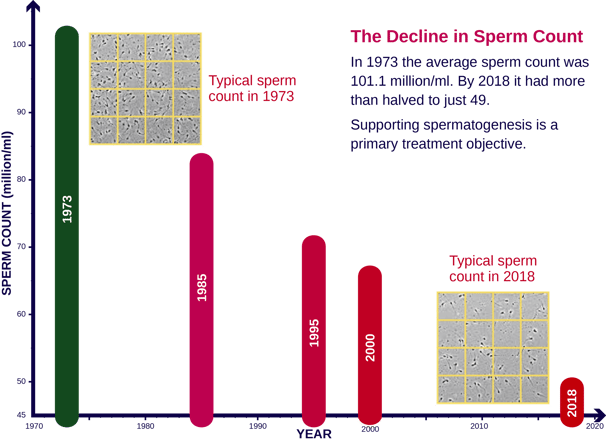Sperm counts across the globe continue to fall and the rate of decline is accelerating!
The worldwide halving of the sperm count in the last 50 years presents serious health challenges to individuals, couples, communities and countries if they remain unaddressed. Not only is the quantity of sperm affected, but markers of viability are compromised too. Some of the questions that arise include:
Is it important?
Why is it happening?
Is everyone affected?
How does it affect us?
What can we do?
We hope that this website addresses your questions and that we can reassure you that help is on hand. A treatment that helps increase sperm count and optimises various parameters that are associated with improved fertility outcomes along with changes to lifestyle and diet should tip the balance in your favour.






These 2 slides demonstrate what a halving of sperm count looks like
The first slide shows a profile of a typical man from the 1973 study whilst the second is from 2018. These are unselected (i.e. randomly selected) men and accurately reflect declining fertility.
Where studies assessed men with normal fertility rates, the change in sperm count was, on average, unchanged. In one study, the sperm count was found to be marginally higher amongst fertile men in 2016 compared with 1978. Among all men, the annual rate of decline in sperm count ranged from 1.2% in 1972 to 2.6% in 2000. If the trend is not addressed the chances of couples having a baby might be severely diminished.
1973 - average sperm count was 101.2 million/ml
2018 - average sperm count was 49.0 (Levine et al)
Progenyx contains essential metabolites that improve sperm and boost male fertility
Progenyx is specially formulated to provide you with the nutrients required for normal spermatogenesis and to support the maturation and activity of the spermatozoa. The better the quality of the sperm the higher the chance of conceiving and having a normal healthy child
Vitamin D plays a major role in male fertility - click here
Vitamins B2, B3, B6 & B12 plus betaine and activated folic acid (methyltetrahydrofolate) are essential for the normal functioning of the one-carbon cycle that regulates the cellular environment. It maintains optimum conditions for sperm development and maturation, it also protects DNA from oxidative stress, ensuring that the sperm are capable of fertilising the egg. Under ideal conditions, the fertilised egg should have a very good chance of maturing into a healthy baby.







